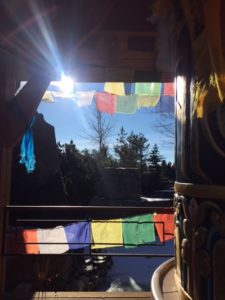H O P E
‘Hope for me is deeply tied to the fact that we don’t know what will happen. This gives us grounds to act.’
“On January 18th, 1915, six months into the first world war, as all Europe was convulsed by killing and dying, Virginia Woolf wrote in her journal, ‘The future is dark, which is on the whole, the best thing the future can be, I think.’ Dark, she seems to say, as in inscrutable, not as in terrible. We often mistake the one for the other. Or we transform the future’s unknowability into something certain, the fulfillment of all our dread, the place beyond which there is no way forward. But again and again, far stranger things happen than the end of the world.
BOB GARFIELD: I want to read you a note from a father to his three daughters on election night, after the kids had pledged a compact to invest their next four years in looking inwards towards the family and relationships and the things that mattered to them the most. The note went as follows:
“Yes, we must look inwards and cherish one another, holding onto our precious love where our own values seem so under attack. But please, we must not retreat from the world, we must never stop believing in and fighting for what is just and sane. Loathe as I am to be a backseat driver in your lives, I do implore you, be courageous. Live your life fighting the fight.”
I’m intimately familiar with those sentiments because I wrote them, but notwithstanding my encouragement to my daughters, no matter what the scope of history one day will provide, in the foreseeable future we are likely as a society to go abruptly and maybe irretrievably backwards on civil rights, human rights, climate, sanity.
REBECCA SOLNIT: You’re talking about two different things, how do we feel and what do we do. And I’m not telling people how to feel, I’m telling people that there is scope for action. One of the great conundrums is that unless we believe there are possibilities we don’t act, but the possibilities only exist if we seize them. And so, a lot of what I’ve been trying to do is encourage people to recognize there is an extraordinary history of popular power in the US but also around the world. I’m not an optimist, as you said in your introduction. Optimism believes that everything will be fine, no matter what we do and, therefore, we don’t have to do a damn thing. Pessimism is the mirror image of that – that believes that everything’s going to hell in a hand basket, and it gets us off the hook. We don’t have to do anything.
Hope for me is deeply tied to the fact that we don’t know what will happen. This gives us grounds to act. And the Trump administration is such an amplifier of uncertainty. Will the guy have some kind of breakdown? Will he get impeached? Will he start World War IV? Will the Republican Party split? Will the Democratic Party find its backbone? So I think that there’s grounds to stay engaged, while being clear that terrible things are happening and we should mourn them.
You keep wanting to talk about despair and I’m just not very interested in it. The situation on climate, which I spent a lot of time looking at and trying to do something about as an activist, is really bleak but there’s wiggle room in there. You know, a lot of extraordinary stuff is happening and it’s happening in very complex ways. One thing that not very many people have noticed, because it’s a change so incremental, is that the technology of renewable non-carbon energy has evolved so dramatically over the last dozen years that we’re in a completely different place than we were at the beginning of the millennium. Bloomberg News ran a story yesterday that within the decade solar power is likely to be cheaper than coal, which is the cheapest fossil fuel. We actually have the energy solutions and they are being adapted pretty rapidly in a lot of places.
You know, we also are looking at the Antarctic ice shelf cracking. We’re looking at sea level rise. We’re looking at chaotic weather. We’re in a very deep crisis. You know, and I want people to be able to hold both of those things. We’re not talking about a future that’s already written.
What we get from the mainstream media over and over and over is a story that what we do doesn’t matter. We have had huge impacts. We have changed what constitutes what’s acceptable and ordinary in innumerable ways. You can tell the story of same-sex marriages, oh, the Supreme Court in its beneficence handed this nice thing down to us, but the Supreme Court decided that this was normal because millions of people had transformed our society in powerful ways over decades about what was normal, and so they did what seemed reasonable, but we defined what reasonable is.
The future is not yet written. What the story is depends on what we make it, and that’s really what I’m here to say.”
Rebecca Solnit is a writer, historian and activist. She’s the author of Hope in the Dark: Untold Histories, Wild Possibilities.
[Full Interview on WNYC/On The Media: https://www.wnyc.org/story/otm-rebecca-solnit-hope-lies-and-making-change/]
[Photo: Prayer Wheel in Sun Valley, Idaho]
‘May the frightened cease to be afraid and those bound be freed; may the powerless find power, and may people think of benefitting one another.’ Shantideva

Leave a Reply